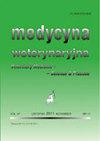Nanoparticles associated with antimicrobial peptides (AMPs) promising combination for biomedical and veterinary applications
IF 0.4
4区 农林科学
Q4 VETERINARY SCIENCES
Medycyna Weterynaryjna-Veterinary Medicine-Science and Practice
Pub Date : 2023-01-01
DOI:10.21521/mw.6835
引用次数: 0
Abstract
Bacterial resistance to classical antibiotics is a growing concern, and scientists are seeking alternative methods to combat bacterial infections. One promising option is the use of antimicrobial peptides (AMPs) with strong antibacterial activity provided with diverse mechanisms, including membrane disruption, intracellular interference, and inhibition of bacterial metabolic processes. They can also modulate inflammation, enhancing antimicrobial effects. Compared to antibiotics, AMPs can have a broader range of activity and are less prone to bacterial resistance. However, their use has limitations, such as a short half-life and proteolytic degradation. To address these challenges, researchers are developing strategies to enhance the stability and efficacy of AMPs, including the use of nanocarriers. Nanocarriers, such as inorganic particles, liposomes, polymeric particles, cubosomes, and quantum dots can improve the stability of AMPs, protect them from degradation, enhance their penetration into bacterial cells, and increase their antibacterial activity. Nanocarriers can also boost AMPs absorption by bacteria and stimulate their enzymatic function. While nanocarriers show promise in enhancing AMPs efficacy and stability, further research is necessary to determine their safety and effectiveness in practical medical applications. This review offers a succinct exploration of specific nanoparticles, their function as carriers for AMPs, and their potential significance in both medical and veterinary contexts.与抗菌肽(amp)相关的纳米颗粒在生物医学和兽医应用中的前景
细菌对传统抗生素的耐药性日益受到关注,科学家们正在寻找对抗细菌感染的替代方法。一个有希望的选择是使用抗菌肽(AMPs)具有很强的抗菌活性,提供了多种机制,包括膜破坏,细胞内干扰和抑制细菌代谢过程。它们还可以调节炎症,增强抗菌效果。与抗生素相比,amp具有更广泛的活性范围,并且不易产生细菌耐药性。然而,它们的使用有局限性,如半衰期短和蛋白质水解降解。为了应对这些挑战,研究人员正在开发提高amp稳定性和有效性的策略,包括使用纳米载体。纳米载体,如无机颗粒、脂质体、聚合物颗粒、立方体和量子点,可以提高amp的稳定性,保护它们不被降解,增强它们对细菌细胞的渗透,提高它们的抗菌活性。纳米载体还可以促进细菌对amp的吸收,并刺激其酶促功能。虽然纳米载体在增强抗菌肽的功效和稳定性方面表现出希望,但需要进一步研究以确定其在实际医疗应用中的安全性和有效性。这篇综述简要地探讨了特定的纳米颗粒,它们作为抗菌肽载体的功能,以及它们在医学和兽医领域的潜在意义。
本文章由计算机程序翻译,如有差异,请以英文原文为准。
求助全文
约1分钟内获得全文
求助全文
来源期刊

Medycyna Weterynaryjna-Veterinary Medicine-Science and Practice
VETERINARY SCIENCES-
CiteScore
0.80
自引率
0.00%
发文量
73
审稿时长
4-8 weeks
期刊介绍:
"Medycyna Weterynaryjna" publishes various types of articles which are grouped in the following editorial categories: reviews, original studies, scientific and professional problems, the history of veterinary medicine, posthumous memoirs, as well as chronicles that briefly relate scientific advances and developments in the veterinary profession and medicine. The most important are the first two categories, which are published with short summaries in English. Moreover, from 2001 the editors of "Medycyna Weterynaryjna", bearing in mind market demands, has also started publishing entire works in English. Since 2008 the periodical has appeared in an electronic version. The following are available in this version: summaries of studies published from 1999 to 2005, full versions of all the studies published in the years 2006-2011 (in pdf files), and full versions of the English studies published in the current year (pdf). Only summaries of the remaining studies from the current year are available. In accordance with the principles accepted by the editors, the full versions of these texts will not be made available until next year.
All articles are evaluated twice by leading Polish scientists and professionals before they are considered for publication. For years now "Medycyna Weterynaryjna" has maintained a high standard thanks to this system. The review articles are actually succinct monographs dealing with specific scientific and professional problems that are based on the most recent findings. Original works have a particular value, since they present research carried out in Polish and international scientific centers.
 求助内容:
求助内容: 应助结果提醒方式:
应助结果提醒方式:


